The plan includes a safe zone, 32 kilometres deep in northern Syria, which would extend along Turkey’s southern border for 480 kilometres. Ten cities and 140 villages are planned to be established in the zone for the settlement of up to 3 million Syrians refugees in Turkey.
This ambitious plan would be a brazen violation of the Syrian territory, and is actually designed to counter the Syrian Kurds and Syria’s Kurdish PYD (Democratic Union Party). From the Turkish government’s viewpoint, PYD is not different from PKK, the archenemy of Turks.
Since 2014 and after the Syrian Army’s withdrawal from the Kurdish regions of Syria following an agreement with the Kurds, the Kurdish regions of northern Syria and the three Kurdish cantons, including Cizre, Kobane and Afrin, had been governed autonomously by the Kurds and the PYD. Later, the administration governing those regions changed its name to Democratic Federation of Northern Syria or Confederation of Northern Syria in order to reduce concerns. The Kurds also invited the Arabs, Assyrian and Syriac Christians, as well as the other minorities to cooperate and have a role in the administrative and military arrangements.
It was unbearable for Turkey to see this new Kurdish neighbour next to its southern borders, particularly given that there is no natural boundary, such as a river, mountain or valley, between the Syrian and Turkish Kurds. In fact, the railway known as the East Express, which had been planned to connect Baghdad to Germany before the First World War, was the criterion for demarcation of border between Turkey and France, as Syria was a French League of Nations Mandate following World War I. This borderline was agreed upon later by Turkey and Syria, but caused a lot of subsequent problems for Turkey.
The Turkish and Syrian Kurds have common language and dialect, share tribal qualities and have age-old bonds. Moreover, many Syrian Kurds are emigrants coming from Turkey and have merged into the Syrian society.
In the first reaction to its new autonomous neighbour, Turkey launched operations against the Kurds on the Syrian soil in alliance with the Free Syrian Army. In a new development, Turkey occupied western regions of the Euphrates, including Afrin canton and a large section of Kobane in two operations: Operation Euphrates Shield in 2016 and Operation Olive Branch in 2018. Turkey and its proxy forces practically gained control of a major section of those two cantons, including the cities of Afrin, Jarabulus and Al Bab, stretching over 4,000 square kilometres on the Syrian territory. The only major Kurdish city in west of the Euphrates that has not yet fallen into the hands of Turkey is the important and strategic city of Manbij. According to an agreement among PYD, the Syrian Army, and the Russian forces, Syria’s military forces entered Manbij and prevented the fall of the city.
Nevertheless, Turkey is sensitive and concerned about the eastern parts of the Euphrates as well, the regions rich in oil and gas resources and an area with fertile soil in Cizre canton in Syria’s Al-Hasakah Governorate. Turkey has repeatedly threatened to take action against the Kurds in that region, but the US mediation had prevented a Turkish attack, as the PYD has worked as the US ally in attacking the ISIS forces in Syria in recent years.
Meanwhile, Erdogan’s government is pressurized even inside Turkey into settling the fate of those regions. For instance, Devlet Bahceli, chairman of Turkey’s Nationalist Movement Party (MHP) and the biggest ally of the Justice and Development Party in the Turkish parliament has strongly criticized the government’s policies, stressing that east of the Euphrates must be set on fire and a buffer security zone should be established 30 kilometres into the region.
Turkey has no good memories of PKK in northern Syria, because former Syrian leader Hafez al-Assad used the PKK and its leader Abdullah Ocalan as a Kurdish card for playing with Turkey given his relations and differences with Ankara. The PKK forces launched tens of attacks against Turkey from northern Syria for years, until the Adana agreement was signed in 1998.
The other point is that the ‘Arab Belt’ initiative proposed by Erdogan at the UN was not a new plan. In fact, it was initially put forward in 1963 by Lieutenant Muhammad Talab Hilal, head of Syria’s secret service in Hasakah. His proposed belt would have begun from Sari Kani city in the west and stretched for 280 kilometres in an area 10 to 15 kilometres deep in Syria along the Turkish border, and would have reached the Iraqi border in the east. Under that plan, the Arabs would have replaced around 140,000 Kurdish people in 332 villages across that area, but the plan was aborted after Hafez al-Assad took power in Syria in 1970.
It seems that Erdogan’s proposal will remain as a plan on the paper, and that neither the regional players, such as Iran and Syria, nor the extra-regional actors like Russia and the US would approve of such a plan in northern Syria. Such schemes will definitely tighten the geopolitical knots in northern Syria. Turkey needs to behave more realistically towards the issues in northern Syria. Such Turkish plan may even force the Syrian Army and its allies to get engaged in the military clashes in northern Syria in order to protect Syria’s territorial integrity.
* Article by Seyyed Mohsen Mostafavi, a visiting fellow at the Centre for Scientific Research and Middle East Strategic Studies (CMESS)
